
This week, Representative Cliff Groh (D-Anchorage) introduced House Bill 153 to increase the oil and gas property tax mill rate which, if passed, would generate significant new revenues and release some of the budget pressure that underpins the legislative tension of recent years.
Currently, municipalities can tax up to 20 mills (2%), and if they do not, the state claims the remainder. HB 153 bill would raise the maximum mill rate from 20 mills to 30 mills (3%) without impacting the amount of revenue local governments can generate. The proposed increase in the mill rate is estimated to raise up to $250 million in additional revenue for the state.
Since 2015, government revenues have steadily fallen and no laws have passed that replace them. Groh emphasized the need for new revenues on the campaign trail and in the Capitol, which he credits to the unanimous recommendations of the Fiscal Policy Working Group.
“This artificial scarcity created by lack of revenue pits Alaskan versus Alaskan. The increased revenue HB 153 will generate for our state will help sustain and grow the Permanent Fund Dividend without compromising high-quality state services,” said Rep. Groh. “We can no longer rely on drawing from savings accounts to fill budget deficits without risking the sustainability of the Permanent Fund,” he said. “This bill proposes a fixed, existing cost for the oil and gas industry to generate new revenue to fund essential services for Alaskans.”
The bill proposes three avenues to use the newly generated revenue: 50% to the capital budget to help pay down the deferred maintenance backlog and invest in essential infrastructure; 25% early education, including pre-K, childcare, and early development; and 25% to higher education investment to enhance the merit-based Alaska Performance Scholarship and the needs-based Alaska Education Grant.
“The benefits of the increased revenue outweigh any potential drawbacks,” said Rep. Groh. “We need to balance the interests of the oil and gas industry with the interests of all Alaskans. Education is the engine of growth in our state. By allocating a portion of the new revenue generated by this bill to early and higher education and the capital budget, we create a skilled workforce that is prepared to compete in the global economy.”
HB 153 has been referred to the House Community & Regional Affairs and House Resources Committees for further consideration.
